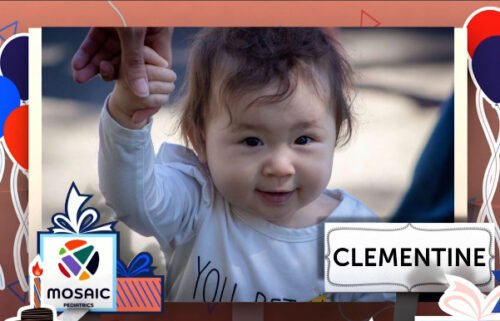Kentucky couple ‘furious’ state abortion laws meant they couldn’t hold their daughter to say goodbye
CNN, WLEX
By Elizabeth Cohen, Carma Hassan and Amanda Musa, CNN
Stanton, Kentucky (CNN) — All Heather and Nick Maberry wanted to do was hold their dead baby, but strict Kentucky abortion laws meant they couldn’t.
They were “furious” that the laws meant they never got to kiss or cuddle their daughter, Willow Rose, or tell her goodbye, Heather said.
“We’ll never know what her face looked like. We’ll never know what it was like to hold her in her arms,” she said. “We’re grieving someone that we’ve never seen.”
The family’s ordeal started in April, when Heather was nearly five months pregnant and they found out their daughter was missing a major part of the brain, a condition called anencephaly. They say their doctors told them she would either be stillborn or die very quickly after birth.
The Maberrys wanted to terminate the pregnancy, but a near-complete abortion ban in their state doesn’t have exceptions for birth defects – even severe ones like anencephaly.
The Maberrys went out of state to end the pregnancy, but their insurance, Kentucky Medicaid, wouldn’t pay for it. They wanted to induce birth so they could hold Willow, but that would’ve cost them tens of thousands of dollars. Instead, they had to settle for a much less expensive surgical procedure – but that procedure does not leave the fetus intact.
“We’re grieving pictures,” Heather said. “We’re grieving a blanket.”
Still distraught after his daughter’s death, Nick sleeps with Willow’s blanket and has not been able to return to his job as a factory worker.
“I was devastated,” he said.
The Maberrys said they’re speaking publicly about their experience in the hopes that their state legislators will listen and revise abortion laws.
Heather wants to protect her three daughters – Madison, 13, Aubrie, 12, and Hadlei, 6 – when they grow up.
“I don’t want my kids to go through what I went through. It just isn’t right,” she said.
CNN reached out to three sponsors of Kentucky abortion laws to ask why fatal fetal anomalies aren’t an exception to the current laws. None of them responded.
‘Please keep our little bean in your prayers’
Nick and Heather knew each other in high school in Stanton, Kentucky, and then met again years later through mutual friends. They married in March 2022 and settled in their hometown.
Nick, now 34, had four children of his own and Heather, now 32, had three. They wanted a baby together, and she became pregnant, only to miscarry in October.
On December 23, they found out Heather was pregnant again. They considered it “our early Christmas present” and proudly displayed four positive pregnancy tests in a Facebook picture few days later.
“Please keep our little bean in your prayers as we wait for our first Doctor appointment,” Heather wrote. “Everything seems to be going good so far. The girls and us are so excited.”
Struck with hyperemesis gravidarum – severe nausea and vomiting during pregnancy – Heather was so sick that she had to stop working as a substitute teacher and was hospitalized for several days.
“I was in the bed all the time,” Heather said. “I’d get maybe one good day out of the week and then the rest of the week would be awful.”
It became difficult to care for her children.
But then she wrote she “got to hear our little baby’s heartbeat,” which was “the most precious gift I could have received.”
Still, the hyperemesis was overwhelming.
“This is pure HELL!!!” she wrote on Facebook.
Then came the anencephaly diagnosis in April, when Heather was 20 weeks pregnant.
“Please keep Nick, me, and our girls in your prayers. We just received the worst news about our baby girl,” she wrote on Facebook and included an ultrasound image. “This is our baby girl, Willow Rose. We love you so very much!!!” She added three emojis: a heart, a rose and a crying face.
Heather’s obstetrician referred them to maternal-fetal medicine specialists at the University of Kentucky, 45 minutes away in Lexington. A report from there the following week laid it out in stark terms: “Anencephaly was confirmed.”
“It was just like a kick in the stomach,” Heather said.
The prognosis for a baby with anencephaly is dire. The National Institutes of Health says that “if the infant is not stillborn, it will usually die within a few hours or days after birth.”
A medical journal article about anencephaly says it is “incompatible with life but not with love.”
That’s how the Maberrys felt: They loved their daughter and did not want her to suffer. They wanted to terminate the pregnancy for Willow’s sake – and for Heather’s. Her hyperemesis wasn’t abating, and she wanted to return to work and to caring for her three children. There was another health concern: Heather had high blood pressure, and continuing the pregnancy could make it dangerously high. While she was willing to take that risk for a live baby, Willow was not going to live.
“I don’t feel like carrying her was an option. Period,” Heather said.
‘We’ll never know what she looks like’
Since Kentucky Medicaid wouldn’t cover the procedure, the Maberrys sought help from organizations that support abortion and from family and friends, but they still couldn’t raise enough for an induction.
A clinic in Chicago agreed to do a surgical procedure called a dilation and evacuation for free, and organizations that support abortion rights paid for their travel expenses, Heather said.
She said the procedure was “a nightmare” and “the worst pain ever” – much more painful than giving birth to her daughters.
The Maberrys said the clinic wouldn’t give them Willow’s remains, which they wanted to cremate. Her medical records from there state that “major fetal parts and placental tissue were identified and the specimen was prepared for disposal.”
The clinic, Family Planning Associates Medical Group of Chicago, declined to comment.
With no remains, with no memories of holding Willow, the family has a baby blanket and some clothing they’d bought for her, a stuffed elephant with a recording inside of her heartbeat and prints of her feet taken at the clinic.
“I wanted to be induced so that we could hold her, so we could see her, so we’d have one memory,” Heather said. “I would have been able to spend just a little bit of time with her.”
“We’re grieving pictures. We’re grieving footprints,” Heather said. “We’ll never know what she looks like. We’ll never know what it was like to hold her.”
The-CNN-Wire
™ & © 2023 Cable News Network, Inc., a Warner Bros. Discovery Company. All rights reserved.



